仁爱版英语七年级下册知识点归纳38851
(完整版)仁爱版英语七年级下全部知识点总结.doc

七年级下英语知识点总结Unit 5 Topic1㈠短语总结1.在学校大门口 at the school gate2.来学校come to school3. 去学校go to school4. 上课have class / have classes5. 步行on foot6.骑自行车ride a bike/ ride bikes/ by bike / on a bike7.坐公交by bus / take a bus8.坐地铁by subway / take the subway / on the subway9.坐飞机by plane/ take the plane / on the plane10.坐小汽车by car / in a car/ take a car/ drive a car11. 坐轮船by ship12. 坐小船by boat13. 坐火车by train / on the train14. 在我们组in our group15.一群学生a group of students16.我们中的三个人 three of us17.在平日 on weekdays18.在周末 on the weekends / at weekends19.起床 get up20.睡觉 go to bed21.早起 get up early22.回家 go home23.到家 get home24.去动物园 go to the zoo25.去公园 go to the park26.看电影 see a movie / film27.看电视 watch TV28.在晚上 in the evening / at night29.帮助父母 help parents30.做某人的家庭作业 do one’s ( my/ her/ his/ your/ their)homework31.在学校 at school32.知道 ,了解 know about / learn about33.校园生活 school life34.一个美国学生 an American student35.在美国 in America / in the U.S.A.36.许多学生 many students/ a lot of students/ lots of students37.很少 very few38.吃午饭 have lunch39.出去吃饭 eat out40.在校期 on school days41.休息一会 have a short rest/ break42.午后 after lunch43.在某人的余 in one’s ( my/ his/ her/ their⋯)free/ spare time44.打球 play basketball45.踢足球 play soccer / football46.琴 play the piano47.吉他 play the guitar48.拉二胡 play erhu49.去游泳 go swimming / go for a swim50.去划船 go boating51.球 a ball game / ball games52.一年四次 four times a year53.听音 listen to music54.read books55.看 read newspapers56.看医生 see a doctor57.去 go to the library58.一周两次 twice a week59.朋友 meet friends60.每天 every day61.在七点半 at half past seven62.一小会 for a little while / for a short time63.晚后 after supper64.吃 have dinner65.吃早 have breakfast㈡重要句型1.I usually come to school by subway.同句 : I usually take the subway to school.划部分提 : How do you usually come to school?似的有:go to school by bike=go to schoolon a bike= ride a bike to school=ride to schoolgo home by bus=go home on a bus=take a bus home2.How do you usually/ often⋯?你通常 /常怎⋯?3.It ’stime for class.=It’s time to have class. =It’s time for having class.4.What about you? =How about you?5.How often ⋯? 率,回答可以用率副: always, usually, often,sometimes, seldom, never, every day ,every +其他名或表示率的短回答表示率的短:次数 +位e.g. : once a day / twice a week / three times a month6.The early bird catches the work. ( ) 笨先7.Work / Study must come first. 工作 / 学必放在第一位!8. Classes begin at eight. =Class begins at eight.提问:What time does the class begin? / What time do the classes begin?㈢重要单词的用法1.look (感官动词 ) 看起来,后面加形容词His mother looks very young.They look very cute.Her dress looks very nice.You look very cool in this coat.2. by 介词by 后面直接加表示交通工具的名词,中间不用任何词修饰,如: by bike by +动词 ing 形式,表示通过某种方式People show love to their mothers by giving cards.You can be a good student by working hard.3.over (形容词 ) School/ Class is over.4.begin现在分词 : beginning 过去式 : beganbegin to do sth , begin doing sthHe begins to write a letter. =He begins writing a letter.如果 begin 本身为分词,只能用begin to do sthHe is beginning to run.5.listen to 听(动作), hear 听见 (结果 )6.always 反义词 never7.本话题涉及的时态为一般现在时,句中常有频率副词或表示频率的短语,如果主语为三单,动词一定要用三单!(四)易错题1.You new watch ______ (look) very nice!2.Here ______(be) some news.3.Oh, come on! It’s time_____ going to school.4.They usually go to school on ________(feet).5.In my class, forty of _______(we) go to school by bike.6.The early bird ______ (catch) the worm.7.Kangkang often _____ (ride) a bike to the park.8.What time _____ (be)school over?9.Work must come ______(once).10.It ’stime ____you to get up.11.We often _____ books in the morning.12.Jill ’s friend like ______(study) in our school.13.Mr. Wang teaches ______(we) English. _____ of us like him.14.How about ______(go) out with me?15.Most students go to school _____ the school bus.16._______ do you go shopping with your mother?A. How soonB. How farC. How oftenD. How much17. What time do you usually get up _____ weekdays?18. He ______ busy, so he has no time to play with us.A. is alwaysB. seldom isC. always isD. often is19.The last class______(finish) at twelve o’clock.20.Let’s go______(boat).21.It’stime to have breakfast. 同(义句 )______________________________________________________.22.Michael often rides a bike to school. 同(义句 )______________________________________________________.23.I always go to work on foot. (对划线部分提问 )______________________________________________________.24.My mother goes shopping twice a week. 对(划线部分提问 )______________________________________________________.25.Mary always reads books in the library. 反(义句 )______________________________________________________.26.He usually does his homework at school.否(定句 )______________________________________________________.27.They often go to school by bus in the morning. 对(划线部分提问 ) ______________________________________________________.28.Jane seldom watches TV on weekdays改.(为一般疑问句 )______________________________________________________.29.He usually has lunch at home. 对(划线部分提问 )______________________________________________________.30.Li Ping often goes to work on foot. (同义句 )______________________________________________________.31.几乎没有学生乘地铁去学校。
仁爱版七年级(下册)知识点要点总结

仁爱版七年级(下册)知识点要点总结本学期研究的知识点包括:
语文
- 形音义的关系
- 修辞手法的运用
- 古诗文的鉴赏
- 现代文阅读与写作
数学
- 相反数与绝对值
- 分数加减乘除
- 二次根式与平方根
- 整式的加减乘除
英语
- 现在进行时
- 祈使句
- 简单过去式
- 数词与日期
历史
- 秦汉和尚书制的改革- 西汉时期的政治和军事- 东汉时期的政治和文化- 三国时期的政治和文化
生物
- 细胞的基本结构和功能- 生物多样性的认识
- 植物的结构和生长
- 动物的体内环境和调节
地理
- 中国的地理位置和自然地理条件
- 中国的人口与经济
- 中国的交通和旅游
- 国际热点问题的认知
政治
- 报告的主要内容
- 中国特色社会主义的本质特征
- 社会主义核心价值观的内涵与精神实质
- 当前的国际形势和中国与世界的关系
以上是本学期主要的知识点汇总。
在学习各科知识的同时,要
注意拓展视野、强化思维训练,努力提高语言表达能力、计算能力、探究能力和综合应用能力。
仁爱英语七年级下册重点语法知识归纳

七年级下期末考试复习一、名词的数可数名词的复数在名词后加“-s/-es”,不可数名词没有复数重点记忆:可数名词:bus-buses box-boxes knife-knives man-men woman-women snowman-snowmen baby-babies glass-glasses family-families tomato-tomatoes(马铃薯) foot-feet mouse-mice child-children shelf-shelvesactivity-activities country-countries mouse-mice wish-wishes leaf-leaves不可数名词:hair chicken rice bread water milk juice food homework work meat单复数都是同一个词(单复同形):Chinese Japanese people sheep(绵羊)一、冠词元音因素前用“an”,辅音因素前用“a”重点记忆:an apple an English teacher an office worker an American an “eleven”一个十一an eraser an egg an orange an ear an actor an office an order (一个命令) an email(一封邮件)冠词“the”是特指,写作时一般用于第二次出现的人和事物二、数词重点记忆:first second third fifth eighth ninth twelfth fifteenth fortieth三、动词1.动词的单三形式:一般加“-s/-es”, 部分双写最后一个字母,辅音+y结尾,要把“y”变成“i”,再加“es”,具体规则参考课本,下面列举出需要重点记忆的单词:do-does have-has teach-teaches go-goes catch-catches fly-flies try-tries study-studies watch-watchesstudy-studies wish-wishes2.动词的“-ing”形式,一般情况下在动词后加“-ing”,不发音的“e”结尾要去“e”后才加“-ing”,如:have-having live-living come-coming drive-driving make-making ride-riding use-using write-writing change-changing shine-shining prepare-preparing share-sharing arrive-arriving believe-believing 部分需双写最后一个字母后再加“-ing”,如:swim-swimming shop-shopping get-getting sit-sitting run-running3.动词的过去式,一般情况下加“-ed”,辅音加“y”结尾,先把“y”变成“i”再加“-ed”,部分要双写最后一个字母,部分是不规则变化,具体参考课本。
(完整)仁爱版英语七年级下册知识点归纳,推荐文档

仁爱版英语七年级下册知识点归纳Unit 5 Our School LifeTopic 1 how do you usually go to school ?1. at the school gate 在学校大门口40. listen to music听音乐2. Happy New Year! 新年快乐41. read books 看书3. The same to you! 也同样祝你 (42). go to the park 去公园4. looks very nice! 看起来漂亮43. go to the zoo 去动物园5. come to school 来上学44. go to the library 去6. come by bike= ride(s) a bike 骑自行车45. go to school 去上学7. go bysubway=take(s) the subway= in a subway 乘46.go to work 去上班地铁47. school is over 放学了8. go by bus=take (s) a bus / in a bus / on abus 乘公共48.class is over 下课了汽车49. in one's free/spare time 在某人的业余9. by plane / by air /in a plane / on a plane 乘飞机时间里50 . play basketball 打篮球10 .by car /in a car / take a car 坐小汽车51.play soccer 踢足球11 . by train / in a train / on a train / take a train 乘火车52.go swimming 去游泳12 . by ship/by boat / on a ship/boat / take the ship 坐船53.go shopping 去买东西54.go fishing 去钓鱼13 . go on foot=walk to 步行55.go skating 去滑旱冰14 . walk to school 走路上学56.go skiing 去滑冰15 . watch TV 看电视57.go climbing mountains 去爬山16 . do one's homework 做家庭作业58.go hiking 去远足17 . see a movie 看电影59.how often 多久一次18 . Good evening 晚上好60.ball games 球赛19 . want to do sth 想要做某事61.have ball games 举行球赛20 . what time 什么时间62.four times a year 每年四次21 . get up 起床63.meet friends 见朋友22 . on weekdays 周末64.once a week 每周一次23 . at about six o'clock 在大约六点钟65.twice a week 每周两次24 . come on 快点66.three times a week 每周三次25 . It's time for class 该上课了67.Work must come first! 工作(学习)必须放在26 . It's time to have class 该上课了第一27 . know about 了解…… 的情况68.twenty past six 六点过二十分28 . school life 学校生活69.at twenty past six 在六点二十分29 . American students 美国学生70.have / has breakfast 吃早餐30 . take a yellow school bu s 乘一辆黄色的校车71.have / has lunch 吃午餐31 . have/has lunch 吃午餐72.have / has supper 吃晚餐32 . at school 在学校,在上学73.have / has dinner 吃晚餐33 . eat out 外出吃饭,上馆子74.half past seven 七点半34 . on school days 在校期间75.a quarter past five 五点过十五分35 . have a short rest 休息一会儿76.get home 到家36 . after lunch 午餐后77.go / goes to bed 上床睡觉37 .after supper/afterdinner晚饭后78.a quarter to ten 十点过十五分38 . after class 下课后79.drive a car 开小汽车39 . after school 放学后80.the Great Wall 长城Topic 2 He is playing soccer on the playground1. Computer room 电脑室17. Good idea! 好主意2. dining hall 食堂18. See you soon 一会儿见3. teachers' office 教师办公室19. play computergam玩电脑游戏4. classroom building 教学楼20. May I borrow ......5. swimming pool 游泳池我可以借…… 吗?6. in the library 在图书馆21. a few 几个,一些7. in the dormitory 在宿舍里22. Ren’ ai Project English workbooks仁爱英语练习8. in the dining hall 在食堂里册9. on the playground 在操场上23. of course = sure = certainly 当然10 .at the moment =now此刻,现在24.on time 准时11 . clean the dormitory 打扫宿舍25.in time 及时12 . clean the bedroom 打扫卧室26.many students 许多学生13 . clean the classroom 打扫教室27.do well in= be good atsth/ doing sth 在 .... 做得14 . clean the blackboard 擦黑板好15 . make cards 制作卡片28.do better in 在——-- 做得更好16 . Would you like to----? 29.on the shelf 在书架上你想做…… 吗?30.return = give back 归还31 . It ' s a pleasure 不用谢50. at the back of 在--- 后部,在--- --- 后面32 .Thank you all thesame还是要谢谢你51. near the playground 在操场的附近33 . lost and found 失物招领处52. in the gym 在体育馆里,在健身房里34 . looking for 寻找53. in the swimming pool 在游泳池里35 . some money 一些钱54. talk about their families 谈论他们的家庭36 . a picture of my family 一张全家福照片55. Attention, please ! 请注意!37 . thank you all the same 还是要谢谢你56. between --- --- and --- --- 在--- --- 和--- - -- 之38 . school student card 学生卡间39 . a pair of pants 一条裤子57. stamp collection show 集邮展40 . a pair of shoes 一双鞋58. school hall 学校大厅41 . two pairs of shoes 两双鞋59. every Saturday 每个星期六42 . singing in the room 在房间里唱歌60. he is running 他在跑步43 . dancing in the gym 在体育馆跳舞61. in picture 1 在第一张照片里44 . swimming in the gym 在体育馆游泳62. in picture 2 在第二张照片里45 . show sb around 带领某人参观63. look(looks) happy 看起来高兴46 . in the center of= in the middle of 64. love swimming 喜欢游泳在--- --- 的中间,在--- --- 的中央65. talk to a Japanese girl47 . on the left 在左边和一个日本女孩交谈48 . on the right 在右边66. play the guitar 弹吉它49. next to 在--- 看,靠近--- 隔壁,在--- --- 旁边,紧挨67 . in the classroom 在教室里69. in the dormitory 在宿舍里68.in the office 在办公室里70. on the playground 在操场Topic 3 our school is very interesting1. What day 用来提问“星期几”27. In the afternoon 在下午2. have a music class 上一节音乐课28.I aften speak English with my classmates 我经常和我3. at ten o'clock 十点钟的同学说英语4. a quarter to eleven 十点四十五分29. After school 放学后5. have a biologylesson 上一节生物课30.Play basketball with my classmates6. have a geography 上一节地理课和同学们打篮球7. have a P.E. lesson 上一节体育课31. On the playground 在操场上8. have an art lesson 上一节美术课32. Every Tuesday 每周二9. outdoor activities 户外活动33. Every Thursday 每周四10 . how many lessons 多少节课34.school newpaper 校报11 . every week 每周35.School Time 校园时代12 . singing and dancing 唱歌跳舞36.And so on 等等13 . drawing pictures 画画37.Science Today 当代科学14 . Working on math problems 做数学题15 . speaking English 说英语38.Thank sb for doing sth16 .learning about thepast了解过去感谢某人做了某事17 . an English book 一本英语书39.best wishes 致以美好的祝愿18 .What do you think of it=How do you like it ? 你觉得40.read stories 看故事书它怎么样?41.have a biology class 上生物课19 . Difficult and boring 难学而且乏味42.have breakfast 吃早饭20 . Which subject 哪一门课43.run on the playground 在操场上跑步21 . Easy and interesting 容易又有趣44.have a physics class 上物理课22 . Favorite subject 最喜欢的科目45.watch animals 观赏动物23 . My school life 我的学校生活46.play soccer at school 在学校踢足球24 . At school 在学校里,在上学47.read a book at home 在家看书25 . Be friendly to sb = be kind to sb 48.have dinner in the school dinning hall 在学校食对某人友好堂吃晚饭26 . In the morning 在上午,在早晨49.have dinner at home 在家吃晚饭Unit 6 Our Local AreaTopic 1 Is there a sofa in your study?1. On the second floor 在二楼9. On the shelf 在书架上2. Why not =Why don't you 10. You have a nice study为什么不--- --- ?你的书房真漂亮!3. Go upstairs 上楼11. Dining room 餐厅4. Go downstairs 下楼12. Living room 客厅5. Have a look 看一看13. On the first floor 在一楼6. A moment later 过了一会儿14. Cousins 表姐妹,表兄弟7. Come in ,please 请进15. In the front of the house 在房子前面8. So many books 这么多的书16. In the kitchen 在厨房17 . In the study 在书房50.A big tree 一棵大树18 . In the dinning room 在餐厅51.Under the tree 在树下19 . In the bedroom 在卧室52.Very beautiful 非常漂亮20 . In the garden 在花园53.A large living room 一个在客厅21 . Behind the door 在门后面54.A dining room 一个餐厅22 . Play with his pet dog 55.A kitchen 一个厨房和他的宠物狗玩耍56.A bathroom 一个卫生间23 . Play games 玩游戏57.I like watching TV in the living room 我喜欢在客厅里24 . Clean the car 清洗小汽车看电视25 . Read books 看书58.I love playing on the computer in the study 我喜欢在26 . Have dinner 吃饭书房里玩电脑27 . Talk about 谈论59.In the drawer 在抽屉里28 . Near my desk 在我桌子旁60.On the chair 在椅子上29 . On your desk 在你桌子上61.Under the chair 在椅子下30 . So on 等等62.In picture A 图A里31 . My family photo 我的全家福照片63.In picture B 图 B 里32 . On the wall 在墙上64.On the walls 在墙上33 . Put them away 请把它们收起来放好65.In 在--- --- 里面34 . Put it away, please 66.On 在--- --- 上面把它/它们收起来放好67.Behind 在--- --- 下面35 . Look after = take care of 照看,照顾68.Near 在--- --- 附近36 . In front the house 房子前面69.Next to 在--- --- 旁边37 . In the bottle 瓶子里70.In the front of 在--- --- 前面38 . Near the window 窗户边71.Don't put it / them here 别把它/它们放在这39 . In the glass 杯子里儿40 . Model planes 飞机模型72.Write a letter 写一封信41 . Under the bed 床下73.Describe different rooms in your home 描述你家42 . How many pairs 多少双不同的房间43 . In the tree 树上74.The things around your home 房子周围的事物44 . On the tree 树上75.I'm very glad to 我很高兴45 . On the shelf 书架上76.Get a letter from sb= hear from sb 收到某人的来信46 . On the river 河里77.Tell sb about sth 告诉某人关于某事47 . A small garden 一个小花园78.Tell sb to do sth 告诉某人做某事48 . Many beautiful flowers 许多美丽的花79.Tell sb sth 告诉某人某事49 . In the garden花园里Topic 2 What's your home like?1. What's your home like? 23. Your new neighbor 你的新邻居你家是什么样的?24. I'm looking for a store 我在找一家商店2. An apartment building 一座公寓25. On the street corner 在街道拐角处3. A town house 城镇住宅26. Post office 邮局4. Live with sb 和某从居住在一起27. Bookstore 书店5. Your grandparents 你的爷爷和奶奶28.Museum 博物馆6. A big farmhouse 农舍29. Parking lot 停车场7. In the country 在农村30. Supermarket 超市8. Look for 寻找31.Hospital 医院9. Let's help him 我们去帮助他吧32. Bank 银行10 . In our group 在我们小组33.Train station 火车站11 . For rent 出租34.Park cars 停车12 . Wanted 求租35.Keep money 存钱13 . Small apartment for students 小型学生公寓36.Take trains 乘火车14 . ¥ 850 a month 每月850 元37.See a doctor 看医生15 . Call Ms. Guan 联系关女士38.Buy food 买食物16 .House with three bedrooms 39.Mail letters 邮寄信一套三居室的房子40.Buy books 买书17 .House with furniture for a family of three 适合三口41.Keep and show things 保存和陈列物品之家,家具齐全的房子42.Bookstored 书店18 .Looking for a quiet doubleroom求租一间安静的双43.Restaurant ['rest ?r?nt] 饭店人间44.I hear you playing the pianounder ¥ 300 per month 月租低于300 元我听到你在弹钢琴19 . Apartment for a family of two 适合两口之家的公寓45.The music is beautiful 音乐很优美20 . House with four bedrooms 四居室46.I'm afaid it's too loud 恐怕声音有点儿大21 . Quiet double room 安静的双人间47.I'm really sorry aboutthat十分抱歉22 . Excuse me 48.Mr. Smart 斯马特打扰了,打扰一下,劳驾,请原谅49.At the end of Elm Road 在榆树路的尽头5 0. On the right 在右边67.A community service center5 1. A tall tree 一棵大一个社区服务中心5 2. Mr. Jackson 杰克逊先生68.Call it for help 打电话向它求助5 3. Mr. Lee 李先生69.How is the community?5 4. Mr. Jones 琼斯先生社区是什么样的?5 5. Mr. Watson 华桑先生70.Living near your home 住在你家附近5 6. I live in Yushancun 玉山村71.Do you like living there?5 7. A quiet community 一个安静的社区你喜欢住那里吗?5 8. Many old people and famillies with young children 许多72.Green Community Service Center 老人和有小孩的家庭绿色社区服务中心5 9. Lot of = lots of 许多73.This is linda speaking. 我是琳达6 0. Tall buildings 高楼74.Apartment 606,building S6 1. Small gardens 小花园S 幢606 号房间6 2.In an apartmentbuilding在一幢公寓里75.What's the matter? 有什么事吗?6 3. Close to 离--- --- 近,紧挨着的76.Kitchen fan 厨房排气扇6 4. Near Xinhua Bookstore 在新华书店附近77.There is something wrong with = Something is wrong6 5. Far from 离--- --- 远with 某人/某物出问题6 6. Not far from 离--- --- 不远78.Get someone to check it 派人去检查一下7 9. Right now 立刻,马上82.The cost of living is high 生活费用高8 0. From--- to--- 从--- --- 到--- --- 83.Houses with big yards 带大院子的房子8 1. The traffic is heavy 交通拥挤84.A house with a garden 有花园的房子Topic 3 How can I get to the bookstore?1. Go up this street to the end尽头沿着这条街一直走到34.35.At Liuli BridgeHow far六里桥“多远”,问距离。
(完整版)仁爱版七年级英语下册知识点总结
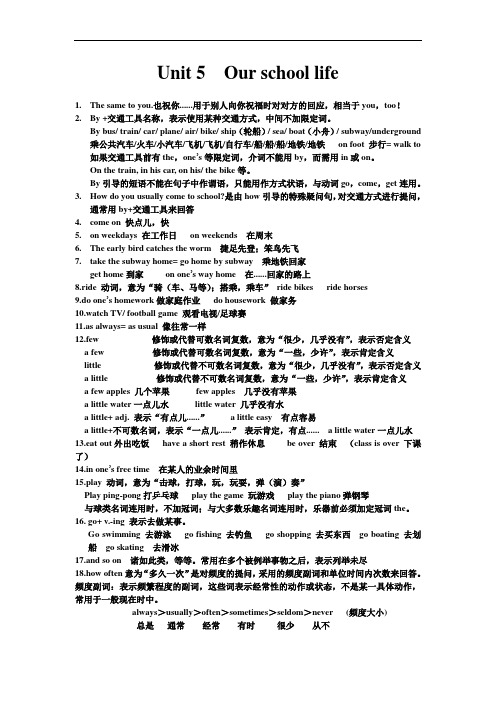
Unit 5 Our school life1.The same to you.也祝你......用于别人向你祝福时对对方的回应,相当于you,too!2.By +交通工具名称,表示使用某种交通方式,中间不加限定词。
By bus/ train/ car/ plane/ air/ bike/ ship(轮船)/ sea/ boat(小舟)/ subway/underground 乘公共汽车/火车/小汽车/飞机/飞机/自行车/船/船/船/地铁/地铁on foot 步行= walk to 如果交通工具前有the,one’s等限定词,介词不能用by,而需用in或on。
On the train, in his car, on his/ the bike等。
By引导的短语不能在句子中作谓语,只能用作方式状语,与动词go,come,get连用。
3.How do you usually come to school?是由how引导的特殊疑问句,对交通方式进行提问,通常用by+交通工具来回答e on 快点儿,快5.on weekdays 在工作日on weekends 在周末6.The early bird catches the worm 捷足先登;笨鸟先飞7.take the subway home= go home by subway 乘地铁回家get home到家on one’s way home 在......回家的路上8.ride 动词,意为“骑(车、马等);搭乘,乘车”ride bikes ride horses9.do one’s homework做家庭作业do housework 做家务10.watch TV/ football game 观看电视/足球赛11.as always= as usual 像往常一样12.few 修饰或代替可数名词复数,意为“很少,几乎没有”,表示否定含义a few 修饰或代替可数名词复数,意为“一些,少许”,表示肯定含义little 修饰或代替不可数名词复数,意为“很少,几乎没有”,表示否定含义a little 修饰或代替不可数名词复数,意为“一些,少许”,表示肯定含义a few apples 几个苹果few apples 几乎没有苹果a little water一点儿水little water 几乎没有水a little+ adj. 表示“有点儿......” a little easy 有点容易a little+不可数名词,表示“一点儿......”表示肯定,有点...... a little water一点儿水13.eat out外出吃饭have a short rest 稍作休息be over 结束(class is over 下课了)14.in one’s free time 在某人的业余时间里15.play 动词,意为“击球,打球,玩,玩耍,弹(演)奏”Play ping-pong打乒乓球play the game 玩游戏play the piano弹钢琴与球类名词连用时,不加冠词;与大多数乐趣名词连用时,乐器前必须加定冠词the。
仁爱版七年级下册知识点总结
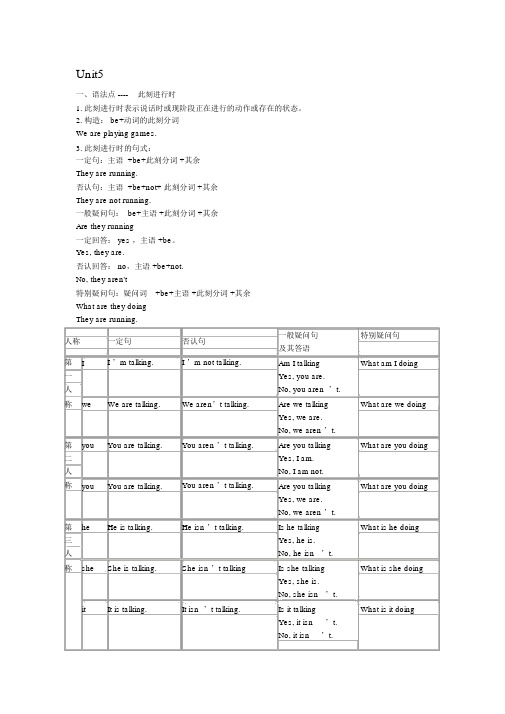
Unit5一、语法点 ----此刻进行时1.此刻进行时表示说话时或现阶段正在进行的动作或存在的状态。
2.构造: be+动词的此刻分词We are playing games.3.此刻进行时的句式:一定句:主语 +be+此刻分词 +其余They are running.否认句:主语 +be+not+ 此刻分词 +其余They are not running.一般疑问句: be+主语 +此刻分词 +其余Are they running一定回答: yes ,主语 +be。
Yes, they are.否认回答: no,主语 +be+not.No, they aren't特别疑问句:疑问词+be+主语 +此刻分词 +其余What are they doingThey are running.人称一定句否认句一般疑问句特别疑问句及其答语第I I ’m talking.I ’m not talking.Am I talking What am I doing一Yes, you are.人No, you aren ’t.称we We are talking.We aren’t talking.Are we talking What are we doingYes, we are.No, we aren ’t.第you You are talking.You aren ’t talking.Are you talking What are you doing 二Yes, I am.人No, I am not.称you You are talking.You aren ’t talking.Are you talking What are you doingYes, we are.No, we aren ’t.第he He is talking.He isn ’t talking.Is he talking What is he doing 三Yes, he is.人No, he isn’t.称she She is talking.She isn ’t talking Is she talking What is she doingYes, she is.No, she isn’t.it It is talking.It isn ’t talking.Is it talking What is it doingYes, it isn’t.No, it isn’t.they They aretalking.They aren’t talking.Are they talkingYes, they are.No, they aren’t.What are they doing4.动词此刻分词组成 :&&正常变化是在动词原型后加ing如:read----reading ;drink---drinking ;eat---eating ;&&以e 结尾的动词,去掉 e 再加ing如:write ---writing ;make--- making ;ride---riding ;&&重读闭音节(只有一个元音字母,而后来跟有一个辅音字母时)要双写结尾的辅音字母再加ingsit---sitting ;swim--swimming ; put---putting ;run — running&&以ie结尾的动词-ie+y+ing:lie -- lying die --- dying&&以 y 结尾的动词变为此刻分词是,总结一添一去y 不变y 不变,直接加上-ing5. 标记词:可用来表示此刻进行时的时间状语,常用的有:now, this week, at this moment 等;或许告诉你一个正确的此刻时间,或许用look, listen提示听者注意正在发生的事。
仁爱版七年级下册知识点归纳

仁爱版七年级下册知识点归纳1.特殊疑问句交通方式:How do you usually come to school?正在干什么:What are you doing now?时间长短:How long…星期几:What day is it today?哪一个…:Which subject do you like best?为什么不:Why not come upstairs and have a look?频率:how often2.There be 句型定义:There be句型表示某处存在某物或某人。
结构:(1) There is +单数可数名词/不可数名词+ 地点状语.(2) There are +复数名词+地点状语.There is a cat under the bed.3.星期:Monday Tuesday Wednesday Thursday Friday Saturday Sunday4.科目:Chinese math English politics history geography physics biology art classmeeting5.一般疑问句Is there a study on the first floor?Are there any books in the study?Are you doing your homework?Is she singing?Are they dancing in the gym?May I borrow a book?6.常见短语句型At the school gateThe same to youBy bike=ride a bikeBy subway=take the subway By bus=take a busOn foot= walk toAt about six o’clock Seldom walk to school Never walk to school Know aboutEat outHave a long/short restIn their free timeAnd so onFor times a year Three times a week Once/twice a week Every dayAt twenty past sixAt a quarter to eleven Take the subway home Do his homework Make cardsSo boringIn the libraryOn the playgroundIn the gymAt the moment Clean the dormitory Of courseDo better inLook forOn the shelf/shelves Return them on timeIt’s a pleasureWhat else Show…aroundRun around the playground In the swimming poolAt the back of the classroom Outdoor activitiesEasy and interesting Difficult and boringBe friendly toSome other subjectsAfter classAfter schoolA nice gardenOn the first/second floor Next toCome upstairsHave a lookLiving room方位词短语In the kitchenBehind the doorIn front of the house Under the bedNear the windowOn the deskIn the center of the yardAt the back of the yardOn the left of the yardOn the right of the yard Next to the yardPut it/them away。
仁爱版英语七年级下册知识点复习归纳(完整版)
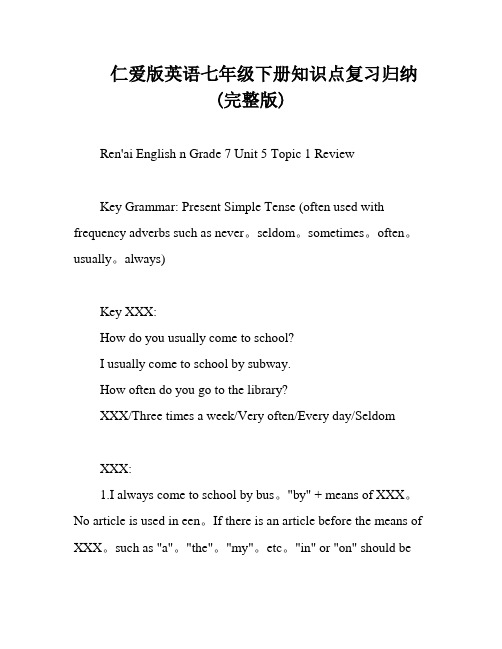
仁爱版英语七年级下册知识点复习归纳(完整版)Ren'ai English n Grade 7 Unit 5 Topic 1 ReviewKey Grammar: Present Simple Tense (often used with frequency adverbs such as never。
seldom。
sometimes。
often。
usually。
always)Key XXX:How do you usually come to school?I usually come to school by subway.How often do you go to the library?XXX/Three times a week/Very often/Every day/SeldomXXX:1.I always come to school by bus。
"by" + means of XXX。
No article is used in een。
If there is an article before the means of XXX。
such as "a"。
"the"。
"my"。
etc。
"in" or "on" should beused instead。
For example。
"on the train" = "by train"。
"on his bike" = "by bike"。
"in my car" = "by car"。
Distinguishing "on foot" and "walk": "on foot" means "walking" and is a nal phrase that cannot be used as a predicate。
(完整版)仁爱英语七年级下册知识点归纳
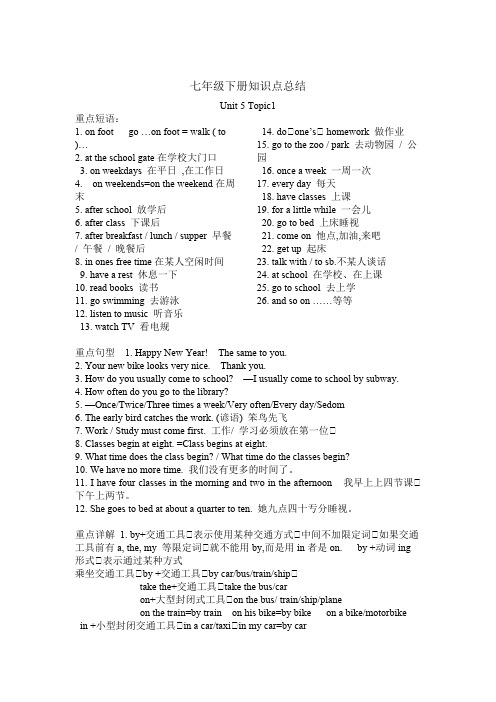
巧辩异同: on foot 与 walk on foot “走路”是介词短语不能作谓语叧
作方式状语位于句末。walk “走路”,是动词可以作谓语。
take the bus = go …by bus ride a bike = go …by bike
take the subway = go …by subway
词性物主代词 my, your, their, our, his, her 等。 do my homework at school 在学
校做作业
5. want to do sth. “想做某事”want 后接动词不定式作宾语。 know about
“了解,知道关于…”。
we want to know about the school life of American students.
重点详解 1. by+交通工具表示使用某种交通方式中间不加限定词如果交通 工具前有 a, the, my 等限定词就不能用 by,而是用 in 者是 on. by +动词 ing 形式表示通过某种方式 乘坐交通工具by +交通工具by car/bus/train/ship
take the+交通工具take the bus/car on+大型封闭式工具on the bus/ train/ship/plane on the train=by train on his bike=by bike on a bike/motorbike in +小型封闭交通工具in a car/taxiin my car=by car
)…
15. go to the zoo / park 去动物园 / 公
2. at the school gate 在学校大门口
(完整版)仁爱版英语七年级下册知识点归纳(完整版)
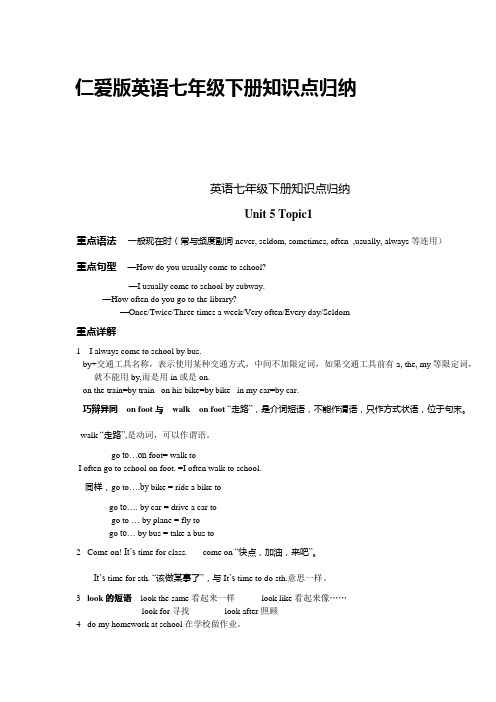
仁爱版英语七年级下册知识点归纳英语七年级下册知识点归纳Unit 5 Topic1重点语法一般现在时(常与频度副词never, seldom, sometimes, often ,usually, always等连用)重点句型—How do you usually come to school?—I usually come to school by subway.—How often do you go to the library?—Once/Twice/Three times a week/Very often/Every day/Seldom重点详解1I always come to school by bus.by+交通工具名称,表示使用某种交通方式,中间不加限定词,如果交通工具前有a, the, my 等限定词,就不能用by,而是用in或是on.on the train=by train on his bike=by bike in my car=by car.巧辩异同on foot 与walk on foot “走路”,是介词短语,不能作谓语,只作方式状语,位于句末。
walk “走路”,是动词,可以作谓语。
go to…on foot= walk toI often go to school on foot. =I often walk to school.同样,go to….by bike = ride a bike togo to…. by car = drive a car togo to … by plane = fly togo to… by bus = take a bus to2 Come on! It’s time for class. come on “快点,加油,来吧”。
It’s time for sth. “该做某事了”,与 It’s time to do sth.意思一样。
仁爱英语七年级下册知识点归纳
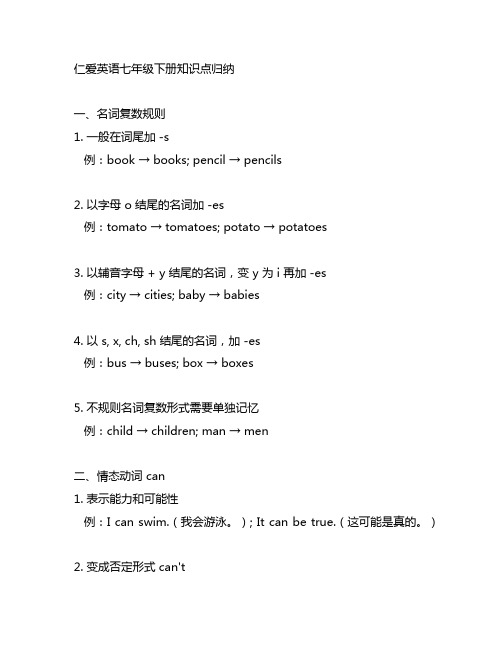
仁爱英语七年级下册知识点归纳一、名词复数规则1. 一般在词尾加 -s例:book → books; pencil → pencils2. 以字母 o 结尾的名词加 -es例:tomato → tomatoes; potato → potatoes3. 以辅音字母 + y 结尾的名词,变 y 为 i 再加 -es例:city → cities; baby → babies4. 以 s, x, ch, sh 结尾的名词,加 -es例:bus → buses; box → boxes5. 不规则名词复数形式需要单独记忆例:child → children; man → men二、情态动词 can1. 表示能力和可能性例:I can swim.(我会游泳。
); It can be true.(这可能是真的。
)2. 变成否定形式 can't例:I can't play the piano.(我不会弹钢琴。
)3. 用于疑问句起询问作用例:Can you speak French?(你会说法语吗?)三、过去时的构成和用法1. 一般过去时构成:动词过去式的基本形式例:I watched TV yesterday.(昨天我看了电视。
)2. 表示过去经常性、习惯性的行为例:He always went to the park on weekends.(他每周末总是去公园。
)3. 表示过去的某一动作或情况例:I lost my pen last week.(上周我丢了我的钢笔。
)四、形容词的最高级1. 形容词最高级的变化规则:在形容词前加 the,形容词后加 -est 例:beautiful → the most beautiful; tall → the tallest2. 表示三者以上的比较级情况例:He is the tallest student in the class.(他是班上最高的学生。
仁爱版七年级下册英语重点知识点总结(短语、句型、语法)
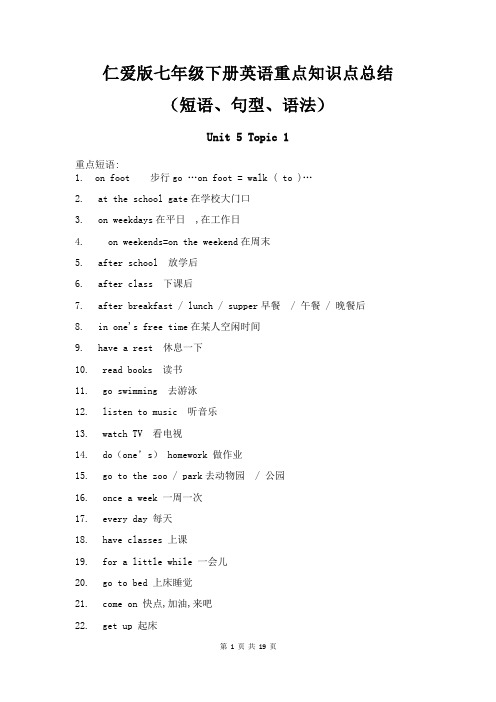
仁爱版七年级下册英语重点知识点总结(短语、句型、语法)Unit 5 Topic 1重点短语:1. on foot 步行go …on foot = walk ( to )…2.at the school gate在学校大门口3.on weekdays在平日,在工作日4.on weekends=on the weekend在周末5.after school 放学后6.after class 下课后7.after breakfast / lunch / supper早餐/ 午餐 / 晚餐后8.in one's free time在某人空闲时间9.have a rest 休息一下10.read books 读书11.go swimming 去游泳12.listen to music 听音乐13.watch TV 看电视14.do(one’s) homework 做作业15.go to the zoo / park去动物园/ 公园16.once a week 一周一次17.every day 每天18.have classes 上课19.for a little while 一会儿20.go to bed 上床睡觉e on 快点,加油,来吧22.get up 起床23.talk with / to s b.与某人谈话24.at school 在学校、在上课25.go to school 去上学26. and so on ……等等重点句型:1. --Happy New Year! --The same to you.2.--Your new bike looks very nice. --Thank you3.--How do you usually come to school? --I usually come to school by subway.4.--How often do you go to the library? --Once/Twice/Three timesa week/Very often/Every day/Seldom5.The early bird catches the worm.(谚语) 笨鸟先飞6.Work / Study must come first.工作/ 学习必须放在第一位!7.Classes begin at eight.=Class begins at eight.8.What time does the class begin?What time do the classes begin?9.We have no more time.我们没有更多的时间了。
仁爱版英语七年级下册知识点归纳完整版

仁爱版英语七年级下册知识点归纳英语七年级下册知识点归纳Unit 5 Topicl重点语法一般现在时(常与频度副词never, seldom, sometimes, often ‘usually,always等连用)重点句型一How do you usually come to school—I usually come to school by subway.—How often do you go to the library—On ce/Twice/Three times a week/Very ofte n/Every day/Seldom重点详解1 I always come to school by bus.by+交通工具名称,表示使用某种交通方式,中间不加限定词,如果交通工具前有a, the, my等限定词,就不能用by,而是用in或是on.on the train=by train on his bike=by bike in my car=by car.巧辩异同on foot 与walkon foot“走路”,是介词短语,不能作谓语,只作方式状语,位于句末。
walk "走路”,是动词,可以作谓语。
go to •••on foot= walk toofte n go to school on foot. =I ofte n walk to school.同样,go to ….by bike =ride a bike togo to …. by cardrive a car to5 we want to know about the school life of American students. 我们想了解一下美国学生的学校生活。
know about“了解,知道关于…”。
6 巧辩异同a few 与fewa few“一些”,few “很少,几乎没有",修饰可数名词。
仁爱版七年级下册知识点归纳.doc

Unit 5 Our School LifeTopic 1 How do you usually come to school一、重点短语:Come on on foot take a bus by bus after school a short time listen toWatch TV know about be over in one ’s free time on weekdays go to bed二、重点句型:1. I never come to school by subway.2. Maria sometimes takes the subway home.3. We usually go to the park on foot.4. I seldom walk to school.5. Li Xiang often rides a bike to school.6. They always go to the zoo by bus.7.--Happy New Year! --Happy New Year!/ The same to you.8.The early bird catches the worm.9.She goes to bed at about a quarter to ten.10. - -How often do you come to the library --Three times a week./ Very often./三、重点知识点1. The sameto you 也祝你。
用于别人向你祝福时对对方的回应,相当于You, too!Have a nice weekend!周末愉快!-- The same to you!也祝你愉快!2.look 在此为系动词,表示“ 看起来,看上去”,后面接形容词。
. She looks very nice.她看上去很漂亮。
仁爱版英语七年级下册知识点复习归纳(完整版)

仁爱版英语七年级下册知识点归纳英语七年级下册知识点归纳Unit 5 Topic1重点语法一般现在时(常与频度副词never, seldom, sometimes, often ,usually, always等连用)重点句型—How do you usually come to school?—I usually come to school by subway.—How often do you go to the library?—Once/Twice/Three times a week/Very often/Every day/Seldom重点详解1I always come to school by bus.by+交通工具名称,表示使用某种交通方式,中间不加限定词,如果交通工具前有a, the, my 等限定词,就不能用by,而是用in或是on.on the train=by train on his bike=by bike in my car=by car.巧辩异同on foot 与walk on foot “走路”,是介词短语,不能作谓语,只作方式状语,位于句末。
walk “走路”,是动词,可以作谓语。
go to…on foot= walk toI often go to school on foot. =I often walk to school.同样,go to….by bike = ride a bike togo to…. by car = drive a car togo to … by plane = fly togo to… by bus = take a bus to2 Come on! It’s time for class. come on “快点,加油,来吧”。
It’s time for sth. “该做某事了”,与 It’s time to do sth.意思一样。
(仁爱版)英语七下各单元知识点归纳.doc

英语七卑怨下册各单无応识点归他Unit 5 Topicl重点语法一般现在时(常与频度副词never, seldom, sometimes, often,usually,always等连用)重点句型一How do you usually come to school?一I usually come to school by subway.一How often do you go to the library?一Once/Twice/Three times a week/Very often/Every day/Sedom重点详解1.1 always come to school by bus.by+交通工具名称,表示使用某种交通方式,中间不加限定词,如果交通工具前有a, the, my等限定词,就不能用by,而是用in或是on.on the train=by train on his bike=by bike in my car=by car.巧辩异同on foot与walk on foot "走路",是介词短语,不能作谓语,只作方式状语,位于句末。
walk“走路”,是动词,可以作谓语。
go to...on foot= walk to I often go to school on foot. =1 often walk to school.同样,go to....by bike = ride a bike to go to.... by car = drive a car togo to ... by plane = fly to go to... by bus = take a bus toe on! Ifs time for class. come on "快点,加油,来吧"。
It's time for sth."该做某事了",与It's time to do sth.意思一样。
- 1、下载文档前请自行甄别文档内容的完整性,平台不提供额外的编辑、内容补充、找答案等附加服务。
- 2、"仅部分预览"的文档,不可在线预览部分如存在完整性等问题,可反馈申请退款(可完整预览的文档不适用该条件!)。
- 3、如文档侵犯您的权益,请联系客服反馈,我们会尽快为您处理(人工客服工作时间:9:00-18:30)。
仁爱版)英语七年级下册知识点归纳2018-09-03??(仁爱版)英语七年级下册知识点归纳Unit?5?Topic1?重点语法一般现在时(常与频度副词never,?seldom,?sometimes,?often,usually,?always等连用)重点句型?—How?do?you?usually?come?to?school???—I?usually?come?to?school?by?subway.????????????—How?often?do?you?go?to?the?library????—Once/Twice/Three?times?a?week/Very?often/Every?day/Seldom重点详解1I?always?come?to?school?by?bus.???by+交通工具名称,表示使用某种交通方式,中间不加限定词,如果交通工具前有a,?the,?my?等限定词,就不能用by,而是用in或是on.???on?the?train=by?train???on?his?bike=by?bike???in?my?car=by?car.???巧辩异同on?foot?与?walk????on?foot?“走路”,是介词短语,不能作谓语,只作方式状语,位于句末。
??walk?“走路”,是动词,可以作谓语。
????go?to…on?foot=?walk?to?????I?often?go?to?school?on?foot.?=I?often?walk?to?school.?????同样,go?to….by?bike?=?ride?a?bike?to??????????go?to….?by?car?=?drive?a?car?t o???????????go?to?…?by?plane?=?fly?to?????????????go?to…?by?bus?=?take?a?bus?to2???Come?on!?It’s?time?for?class.???????come?on?“快点,加油,来吧”。
It’s?time?for?sth.?“该做某事了”,与?It’s?time?to?do?sth.意思一样。
3???look的短语????look?the?same看起来一样look?like看起来像……???look?for寻找????look?after?照顾4???do?my?homework?at?school?在学校做作业do?one’s?homework?做家庭作业(注意:one’s?要随主语的变化而变化,常用形容词性物主代词????my,?your,?their,?our,?his,?her等)。
5???we?want?to?know?about?the?school?life?of?American?students.?我们想了解一下美国学生的学校生活。
????know?about?“了解,知道关于…”。
6???巧辩异同?a?few与few????a?few?“一些”,few“很少,几乎没有”,修饰可数名词。
?a?little与little a?little“一些”,little“很少,几乎没有”,修饰不可数名词。
7????They?often?play?basketball?or?coccer,?go?swimming?and?so?on.?????go?swimming?去游泳and?so?on?“等等”,表示还有很多。
?拓展?go+v.-ing?表示去做某事,类似的有:????go?fishing?去钓鱼??go?shopping?去买东西???go?boating?去划船??go?skating?去滑冰8???How?often?do?you?go?to?the?library?你多久去一次图书馆??????how?often“多久一次”,问频率。
答语常用频度副词never,?always,often等或单位时间内的次数once?a?week一周一次?twice?a?month每月两次three?times?a?year每年三次语法讲解????????????????一般现在时一般现在时表示:(1)现在所处的状态。
Jane?is?at?school.(2)经常或习惯性的动作。
I?often?go?to?school?by?bus.(3)主语具备的性格和能力。
He?likes?playing?football.(4)客观真理。
The?earth?goes?round?the?sun.?????常用的时间状语:often,?always,?usually,?sometimes,?every?day等等。
?????行为动词的一般现在时,助动词是do/don’t和does/doesn’t.当主语是第一、二人称和所有复数形式时,行为动词用原形。
?????肯定式:I?go?to?school?on?foot.???????????否定式:I?don’t?go?to?school?on?foot.?????疑问式:Do?you?go?to?school?on?foot???—Yes,?I?do.?—No,?I?don’t.?????当主语是第三人称单数时,动词用第三人称单数形式,在词尾加-s或-es。
?????肯定式:He?goes?to?work?by?bus.????否定式:He?doesn’t?go?to?work?by?bus.?????疑问式:Does?he?go?to?work?by?bus????—Yes,?he?does.?—No,?he?doesn’t.Topic2重点语法现在进行时态。
重点句型What?are?you?doing???????He?is?cleaning?the?dormitory.????Are?you?doing?your?homework???Yes,?I?am./No,?I?am?not.???????????How?long?can?I?keep?them???Two?weeks.重点详解1????at?the?moment“此刻,现在”,相当于now.2????巧辩异同go?to?sleep与go?to?bed?????①?go?to?bed“上床”“就寝”I?often?go?to?bed?at?ten.?②?go?to?sleep“入睡”“睡着”Last?night?I?went?to?sleep?at?two?o’clock.3????巧辩异同some,?a?few?与a?little“一些,有些”三者都修饰名词。
?some既可以修饰可数名词又可以修饰不可数名词。
We?want?some?apples?and?some?water.?a?few用在可数名词复数之前,a?little用在不可数名词之前。
There?are?a?few?books?and?a?little?waterin?the?classroom.4????与how相关的短语how?often多常how?many多少?how?much多少钱?how?old多大5????And?you?must?return?them?on?time.你必须按时归还它们。
Return意为“归还,回归”?????①?return?sth.?to?sb.把某物归还某人=give?back?sth.?to?sb.?????②?return?to“回到…”,相当于come?back?to…6????Maria?and?a?girl?are?talking?at?the?lost?and?found.?????talk“交谈”,常用的短语talk?to/with?sb.“与某人交谈”巧辩异同talk,?say,?speak与tell?????(1)?talk“交谈”,表示通过谈话方式交换意见、消息等。
?????(2)?speak“说话”,强调开口发声,后常接某种语言。
?????(3)?say?“说”,强调所说的话的内容。
?????(4)?tell“告诉”,有时兼含“嘱咐”“命令”等。
tell?a?truth说真话,tell?a?lie说谎,?tell?a?story?讲故事等固定搭配。
7??I?can’t?find?my?purse?and?I?am?looking?f or?it.?look?for“寻找”,强调寻找的过程;?find“找到”强调找的结果。
8????look(at),?see与?read look(at)指看的动作,see指看的结果,read常指看书、看报纸等。
9????Here?are?some?photos?of?his.这有他的一些照片。
?????photos?of?his是双重所有格。
his是名词性物主代词,后还可以接名词所有格。
a?friend?of?mine我的一个朋友???a?classmate?of?my?brother’s我弟弟的一个同学10???I?also?want?to?go?there?one?day.我也希望有一天到那儿。
?????also意为“也”,常用于be动词和情态动词后面,实义动词的前面。
???巧辩异同?also与too also放在句中,too用于句末。
语法讲解??????????????????现在进行时1.现在进行时表示:现在正在进行或发生的动作。
2.常用的时间状语:now,?at?the?moment,?look,?listen等。
3.谓语动词构成:be(am/is/are)+v.-ing形式。
4.现在进行时态的肯定、否定和疑问式。
(1)肯定式:I?am?running.??You?are?running.??He/She?is?running.(2)否定式:I’m?not?running.??You?aren’t?running.??He/She?isn’t?running.(3)一般疑问句及回答:—Are?you?running???—Yes,?I?am./—No,?I?am?not.—Is?he/she?running??—Yes,?he/she?is./?—No.?he/she?isn’t.Topic3?重点语法一般现在时和现在进行时的使用和异同。
重点句型?What?day?is?ti?today??It’s?Wednesday.???????????????Why?do?you?like?it??it’s?easy?and?interesting.????????????What?class?are?they?having??They?are?having?a?music?class.重点详解1???询问星期几用What?day…?回答:It’s?Wednesday/Sunday…。
